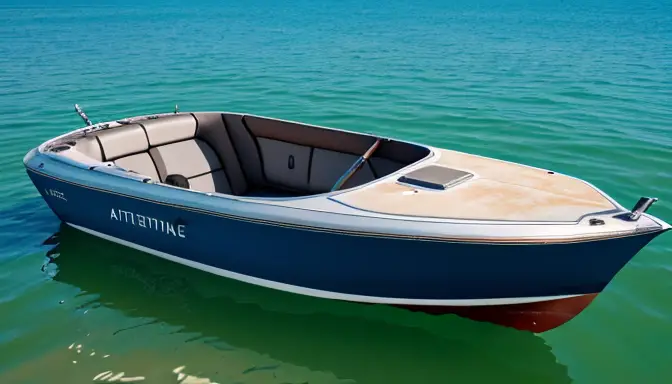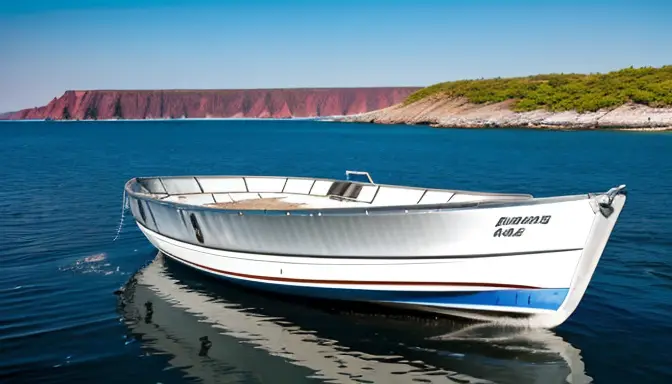Aluminum boats are popular for their durability, but they are not without issues. Understanding the common problems associated with aluminum boats can help owners prevent costly repairs and ensure their vessel remains seaworthy.
- Corrosion: Aluminum boats are susceptible to corrosion, especially in saltwater environments. Regular inspections and proper maintenance can help prevent corrosion from weakening the boat’s structure.
- Electrolysis: Electrolysis occurs when dissimilar metals come into contact with each other in the presence of an electrolyte, leading to rapid corrosion. Understanding how to prevent and address electrolysis is crucial for aluminum boat owners.
- Leaks and Hull Damage: Leaks and hull damage can compromise the integrity of an aluminum boat. Checking for leaks, addressing them promptly, and repairing any hull damage are essential for maintaining the boat’s safety and performance.
- Paint and Coating Issues: Paint and coating issues, such as peeling, bubbling, or fading, can affect an aluminum boat’s appearance and protection. Proper surface preparation and choosing the right coatings can help prevent these problems.
- Weld Failures: Weld failures can occur in aluminum boats due to poor craftsmanship, fatigue, or stress. Inspecting welds regularly and addressing any signs of failure can prevent structural issues and ensure the boat’s safety.
- Aluminum Fatigue: Aluminum fatigue can lead to cracks and structural weaknesses in boats that are subjected to frequent use or rough conditions. Understanding the signs of aluminum fatigue and taking preventive measures are crucial for boat maintenance.
- Anode Maintenance: Anodes are sacrificial metals that protect aluminum boats from corrosion. Proper anode maintenance, including regular inspection and replacement, is essential for preserving the boat’s aluminum components.
- Deck and Structural Integrity: Deck and structural integrity are vital for the safety and longevity of an aluminum boat. Regularly checking for signs of wear, stress, or damage in the deck and structure can help prevent accidents and costly repairs.
Corrosion
Corrosion is a common issue that aluminum boat owners need to be vigilant about. The exposure to saltwater environments makes aluminum boats susceptible to corrosion, which can weaken the boat’s structure over time. To prevent corrosion from causing significant damage, regular inspections are crucial. By inspecting the boat’s hull and components for signs of corrosion, owners can take timely action to address any issues before they escalate.
One effective way to combat corrosion is through proper maintenance practices. Keeping the boat clean and dry, especially after use in saltwater, can help prevent corrosion from taking hold. Additionally, applying protective coatings and ensuring that the boat’s anodes are functioning correctly can provide an extra layer of defense against corrosion.

Electrolysis
Electrolysis is a common issue that aluminum boat owners need to be aware of. This process occurs when dissimilar metals on the boat come into contact with each other in the presence of an electrolyte, resulting in rapid corrosion. To prevent electrolysis from damaging the boat’s structure, it is essential to take proactive measures.
One way to address electrolysis is by installing sacrificial anodes on the boat. These anodes, typically made of zinc or magnesium, corrode instead of the aluminum hull, protecting the boat from galvanic corrosion. Regularly inspecting and replacing these anodes is crucial for maintaining the boat’s integrity.
Additionally, avoiding leaving metal objects in contact with the aluminum hull can help prevent electrolysis. Properly isolating different metals and ensuring there is no direct contact between them can reduce the risk of corrosion.
Leaks and Hull Damage
Leaks and hull damage are common issues that aluminum boat owners should be vigilant about. Even a small leak can lead to significant problems if left unaddressed. Regularly inspecting the boat for leaks and hull damage is crucial to maintaining its integrity and safety. When addressing leaks, it is important to use high-quality sealants and follow proper repair procedures to ensure a lasting solution.
Additionally, hull damage, whether from impacts or wear and tear, can compromise the boat’s structural integrity. Promptly repairing any hull damage is essential to prevent water intrusion and further deterioration. Properly reinforcing and sealing damaged areas can help extend the lifespan of the boat and prevent more extensive repairs down the line.

Paint and Coating Issues
Paint and coating issues can significantly impact the appearance and protection of an aluminum boat. When the paint or coating starts peeling, bubbling, or fading, it not only looks unsightly but also exposes the metal to potential corrosion. To address these problems effectively, boat owners should:
- Proper Surface Preparation: Before applying any paint or coating, ensure that the surface is clean, dry, and free of any contaminants. Proper preparation can help the paint adhere better and last longer.
- Choose the Right Coatings: Selecting high-quality marine-grade paints and coatings specifically designed for aluminum boats is crucial. These coatings offer better protection against UV rays, saltwater, and other environmental factors.
- Regular Maintenance: Inspect the paint and coating regularly for any signs of damage or wear. Addressing small issues promptly can prevent them from escalating into more significant problems.
Weld Failures
Weld failures in aluminum boats can be a serious issue that compromises the structural integrity and safety of the vessel. There are several factors that can contribute to weld failures, including poor craftsmanship, fatigue, or stress. It is crucial for boat owners to regularly inspect the welds on their aluminum boats and address any signs of failure promptly to prevent further damage. Here are some key points to consider when dealing with weld failures:
- Regular Inspection: Inspect all welds on the boat regularly to check for cracks, signs of corrosion, or any other abnormalities that could indicate potential failures.
- Professional Assessment: If you are unsure about the condition of the welds or suspect any issues, it is advisable to seek professional help from a marine welder or technician.
- Preventive Maintenance: Implement preventive measures such as applying protective coatings or sealants to the welds to reduce the risk of failure.
- Quality Welding: Ensure that any repairs or modifications involving welding are done by experienced professionals using high-quality materials to prevent future weld failures.

Aluminum Fatigue
Aluminum fatigue is a critical issue that aluminum boat owners should be aware of to ensure the safety and longevity of their vessels. This type of fatigue can result from constant exposure to rough conditions or frequent use, leading to cracks and structural weaknesses that compromise the boat’s integrity.
To prevent aluminum fatigue, it is essential for owners to conduct regular inspections of their boats and watch for signs of fatigue, such as cracks or deformities in the metal. Taking preventive measures can help extend the lifespan of the boat and avoid costly repairs down the line.
Additionally, proper maintenance practices, such as storing the boat in a secure location when not in use and avoiding overloading it beyond its capacity, can help reduce the risk of aluminum fatigue. By staying vigilant and addressing any signs of fatigue promptly, owners can ensure their aluminum boats remain in top condition for years to come.
Anode Maintenance
When it comes to maintaining your aluminum boat, is a critical aspect that should not be overlooked. Anodes play a crucial role in protecting the aluminum components of your boat from corrosion by acting as sacrificial metals. Here are some key points to consider for effective anode maintenance:
- Regular Inspection: Periodically check the condition of the anodes to ensure they are intact and functioning properly. Look for signs of wear or deterioration that may indicate the need for replacement.
- Proper Installation: Ensure that the anodes are correctly installed in the appropriate locations on the boat’s hull and other metal components. Proper installation maximizes their effectiveness in preventing corrosion.
- Replacement Schedule: Follow the manufacturer’s recommendations for replacing anodes at regular intervals. Over time, anodes will deteriorate and lose their protective properties, so timely replacement is essential.
- Compatibility: Use anodes made from compatible metals to the aluminum of your boat. Using incompatible anodes can lead to ineffective protection and potential damage to the aluminum components.

Deck and Structural Integrity
Deck and structural integrity are crucial factors in ensuring the safety and longevity of an aluminum boat. The deck serves as the foundation of the vessel, supporting everything from passengers to equipment. Regularly inspecting the deck for signs of wear, stress, or damage is essential to prevent accidents and maintain the boat’s structural integrity.
When checking the deck, pay close attention to any soft spots, cracks, or loose fittings that could indicate underlying issues. Addressing these issues promptly can prevent further damage and ensure the deck remains sturdy and safe for use. Additionally, inspecting the structural components of the boat, such as supports and reinforcements, is vital to identify any potential weaknesses that could compromise the boat’s overall stability.
Creating a maintenance schedule for deck and structural inspections can help boat owners stay on top of potential issues and address them before they escalate. By prioritizing the integrity of the deck and structure, owners can enjoy peace of mind knowing their aluminum boat is safe and reliable on the water.
Frequently Asked Questions
- How can I prevent corrosion on my aluminum boat?
Regular inspections and proper maintenance, such as applying protective coatings and keeping the boat clean, can help prevent corrosion.
- What should I do if I notice paint or coating issues on my aluminum boat?
Addressing paint or coating issues promptly by sanding, priming, and repainting the affected areas can help maintain the boat’s appearance and protection.
- Why is anode maintenance important for aluminum boats?
Anode maintenance is crucial as anodes protect the aluminum components of the boat from corrosion by sacrificially corroding instead. Regular inspection and replacement of anodes are essential.
- How can I check for signs of aluminum fatigue in my boat?
Look for cracks, deformations, or unusual noises while sailing, as these can indicate aluminum fatigue. Taking preventive measures like reducing stress on the boat can help prevent further damage.
- What Happened to Bluewater Yachts? The Inside Story - May 31, 2024
- Upgrade Your Boat’s Water Pump to the Mach 5 - May 30, 2024
- Upgrade Your Boat with the Big Stuff Stuffing Box - May 30, 2024


